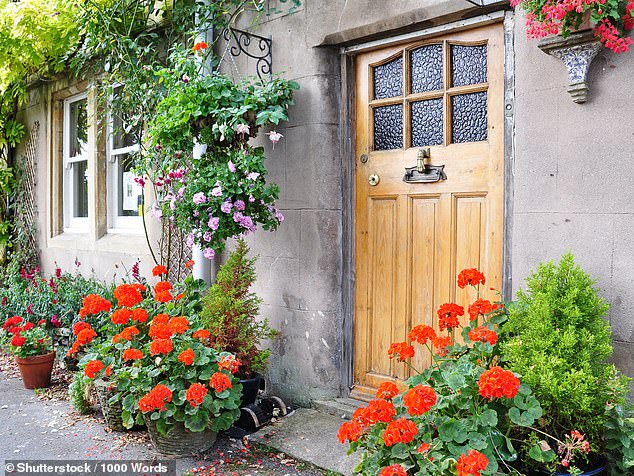My older brother is living in our late mum’s house and he’s promised to leave his share to me – but does his DIY will mean anything?
My elderly mum died recently leaving the family home, which was in her sole name as my dad died many years ago, to my older brother and I.
He is actually a half-brother – my mum’s son from her first marriage – and is now 65, single and childless.
He has had, since he was a toddler, little or no contact with his genetic dad. I don’t know if this man is alive but I know he did go on to have another child – so my brother has at least one other half-sibling, apart from me.
Although, again, there has never been any contact between them and my brother.

Inheritance dilemma: My older half-brother is living in our late mum’s house, and he’s promised to leave his share to me when he dies
My brother has been living in my mum’s house for several years, since she went into a home, and wants to stay there. I’m happy for this to continue as I do not need my share of the property now.
But I think it’s reasonable for me to want to make sure his share passes to me when he dies.
He says he has made a will that leaves everything of his to me but it is apparently a DIY one, and it might not be legally robust.
If I do nothing and his will turns out not to be worth the paper it is written on, what are the chances of his half of the property going to someone else?
Tanya Jefferies, of This is Money, replies: You are right to be concerned about a DIY will, as they are risky.
The situation you describe is complicated, involving branches of family no one is even in contact with right now.
You also need to take account of the fact you might die before your brother, and the problems your heirs might be left to deal with if you postpone sorting this out with him.
We asked a lawyer to look at what you and your brother might do to ensure you get the outcome you want.
Helen Taylor, partner and head of private client at Franklins Solicitors, replies: It is always hard when a loved one dies and grief and inheritance issues can put strain on family relationships.


Helen Taylor: ‘Your brother has the right to change his will at any time and does not have to tell you if he does so’
Agreements made while grieving are often regretted or forgotten as time passes.
I do think you should make sure that your agreement with your half-brother is sorted out even if he finds it hard to deal with.
You could always try to sell it to him along the lines of wanting to give him security and protection too.
It is much better to bite the bullet and deal with things now rather than hoping that your brother will do the right thing in the future.
Leaving his share of the house to you by will is not the only option and don’t forget, you do have the upper hand now because you are the one who is agreeing not to sell the house and have your share immediately.
You will also need to talk about practicalities such as who is going to pay for repairs, insurance, and maintenance.
It is important as well for you to have a valid will which makes clear who would inherit your share of the house, as you might die before your brother.
That is yet another reason to get matters straight now, as you don’t want to risk bequeathing a messy situation to your own heirs.
How can you ensure you inherit your share of the house, without relying on your brother’s will?
You could agree to change the terms of your late mother’s will and say that the whole house is put into a ‘trust’ instead.
Your brother can be given the right to live there for the rest of his life and you get the house when he dies.
A slightly different way of doing the same thing if your brother doesn’t like the idea of not actually owning a share of the house, would be to do a ‘declaration of trust’ over it.
Again, although you both stay as legal owners, your brother has a right to live there and you have the right to the house when he dies.
You will both need to agree to this and do make sure you seek advice from a solicitor who specialises in trusts so that you both understand all the pros and cons and ensure it is done properly.
How should you set up ownership of the house, if you decide against a trust?
If you haven’t already got one, you will need to apply for a grant of probate for your late mother’s estate and you will need to update the title deeds of the house.
If you’re not going down the trust route, you will need to decide whether you and your brother want to own the house as ‘joint tenants’ or ‘tenants in common’.
These are technical terms and it is important you understand which one to go for and that your solicitor is told.
If you own the house as joint tenants then on the death of the first of you, the survivor will automatically be left owning the whole house even if their will says something different.
If you own it as tenants in common you both own separate shares which will then pass in line with what your wills say.
Joint tenants could work well for you provided your half-brother died first but of course, if you were to die first it would all pass to him.
We don’t have a crystal ball and I wouldn’t normally suggest anyone should take that risk.
What should you ask your brother to do about his will?
If you decide to own the house as ‘tenants in common’, your brother needs to make a will which leaves his share of the house to you.
Wills are technical documents and they need to be signed, dated and witnessed correctly to be valid.
If he uses the wrong type of words to leave you his share in the house, it might fail and you might end up with nothing.
Far too much can go wrong with DIY wills and I strongly recommend you and he get advice from a solicitor who specialises in drafting wills and trusts.
If you are looking for a solicitor, try to find one who is a member of the Society of Trusts and Estate Practitioners. They will have the letters TEP after their names.
What are the risks of depending on your brother’s will?
STEVE WEBB ANSWERS YOUR PENSION QUESTIONS

You have to understand that your brother has the right to change his will at any time and does not have to tell you if he does so.
Also, if he marries in the future, any will would automatically be cancelled.
If your brother doesn’t make a will or his DIY will is invalid or cancelled, the intestacy law will decide how his estate is shared.
This sets out a strict list of relatives who will inherit and the order they inherit in is often surprising.
On the basis that your brother is not married or in a civil partnership at the date of his death and has no children of his own, the first person to inherit would be his father.
You have said that you do not know he is alive but if he is, you could end up with nothing.
If his father has died, and assuming that your late mother did not have other children with her first husband, the next group of people to inherit are all the half-siblings.
You have said that your brother’s father did have other children and so they, as well as you, will all inherit an equal share of your brother’s estate, whether he knew them or not.
I am afraid that if the will turns out to be not worth the paper it’s written on you could end up receiving nothing at all or sharing his half of the house with his other half-siblings.
Likewise, if he changes his will or remarries or even if he simply loses his will, you could end up with nothing.
What is the safest approach to ensuring you get your share of the house?
The only sure fire way of guaranteeing the outcome is to make sure your interest is protected by way of a trust.
It’s probably time to have that conversation with your brother. Good luck.

